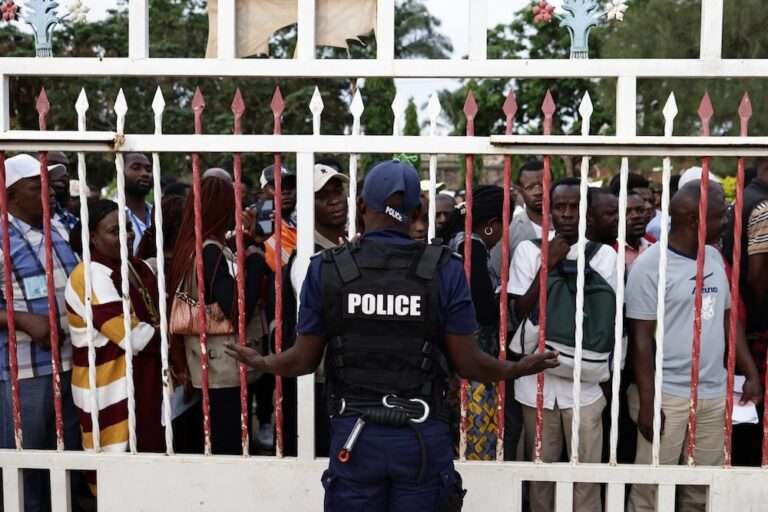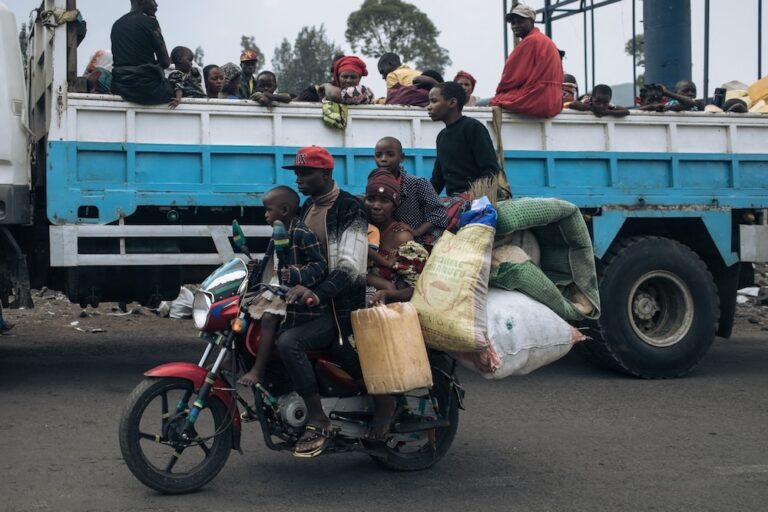(JED/IFEX) – Only a week after their broadcast programming had resumed, after being suspended by the illegal and unfair cutting of their signal for 21 days, both of the television channels, Canal Congo Television (CCTV) and Canal Kin Television (CKTV), were shut down again in the early evening hours of 18 September 2006, by a […]
(JED/IFEX) – Only a week after their broadcast programming had resumed, after being suspended by the illegal and unfair cutting of their signal for 21 days, both of the television channels, Canal Congo Television (CCTV) and Canal Kin Television (CKTV), were shut down again in the early evening hours of 18 September 2006, by a mysterious fire which broke out and caused extensive damage. CKTV is privately-owned by vice-president, Jean-Pierre Bemba Gombo, who is a candidate in the second runoff of the presidential election.
According to the testimonies gathered by JED at the scene of the blaze, journalists and technicians working for these channels were surprised by a sudden “explosion”, which was followed soon afterwards by a huge flame. The fire spread quickly on the third floor of the building that hosts the channels’ editorial offices and studios. The same witnesses attested that important equipment was damaged and that persons inside the building were injured. The general manager of CCTV, Mr. Stephane Kitutu Oleontwa, suffered serious burns and was admitted to the emergency department at a local Kinshasa hospital.
During the early afternoon hours of 19 September 2006, a troublesome situation reigned in front of the headquarters of these TV stations, where a crowd of supporters of the People’s Movement for the Liberation of Congo (MLC), the political party of Mr. Jean-Pierre Bemba, and some onlookers were stoning police officers as they attempted to disperse the demonstrators. Questioned by JED, most of the demonstrators told the watchdog organization that, this fire, which set ablaze these television outlets just few days after the resumption of their broadcasts, was seen as “a barbaric act of sabotage”.
JED is seriously concerned by this awful situation, which has, as an immediate consequence, an effect of silencing media outlets that are considered “troublesome”. JED hereby recalls the substance of its last open letter addressed to the special representative of the UN Secretary General in DR Congo, Mr. William Lacy Swing. In that letter, JED voiced its fears vis-à-vis the situation of extremely high tension created and maintained around these television channels, which were accused of many wrongdoings, since the provisional results of the 30 July first round of presidential elections were announced.
At a minimum, JED has noted that the destruction of these TV stations can be added to a series of events, which have targeted the media since the beginning of the year. Apart from making a few mere statements expressing good intentions, the government has never carried out a thorough investigation to shed light on any of these cases.
To illustrate:
1. The “Radio Sankuru Liberté”, privately-owned by Mr. Joseph Olengakoy and based in Lodja, a territory located in the Eastern Kasai Province, was set ablaze in January 2006, by unknown persons.
2. The headquarters of the Radio-Television Message of Life (Radiotelevision Message de Vie, RTMV) in Binza/Pigeon District, privately-owned by the Army of Victory church, was wrecked on 22 May at approx. 9:00 p.m. (local time) by a dozen heavily armed, plain-clothed men, who jumped down from three Prado trucks. They destroyed the TV transmitter and then carried away the video/audio mixer, a computer, a TV monitor, and mobile phones. They also seriously beat four technicians that they encountered at the RTMV outlets.
3. The site hosting the CCTV (Canal Compo Television) relay antenna in Kisanga, which is a small town located not far from Lubumbashi, capital city of Katanga province, was sabotaged on 29 March, by unidentified armed men. A maintenance technician from the permanent staff was found that night stabbed to death.
4. On the night of 15-16 April, in Butembo, (the second city of North Kivu province, located 350 km from Goma, in eastern DR Congo), unidentified armed men seriously damaged the transmitters of RTG@ (RadioTelevision Groupe l’Avenir), which is privately-owned by an MP who is a senior member of the presidential party), Digital Congo, which is privately-owned by President Kabila’s family, and the RTNC, DR Congo’s national public radio broadcasting and television corporation.
5. Tujenge Kabambare, the only community radio station based in Kabambare, which is a territory located about 450 km from Kindu, the capital city of Maniema province, was wrecked and its editor beaten, on 24 May, by military officers who acted on orders by a well-known commander in the vicinity. The commander even boasted of inflicting “such a punishment” against the media outlet, which was disturbing him.
6. With respect to these incidents and attacks against the media, which have gone not only unpunished, but also unexplained, JED demands that a thorough and joint investigation be carried out by the government and MONUC (The United Nations Mission in DR Congo). An investigation is urgently required to determine the causes and identify those responsible for this campaign of violence against the media, particularly in the lead-up to the second round of presidential election campaigning.
JED urges an end to all threats, intimidation and the systematic stigmatization of media and journalists, including those who have treated media professionals as scapegoats of politicians’ failures and therefore as justifiable targets.
In accordance with the clauses on the exercise of freedom of expression in DR Congo contained in the 22 June1996 Law N0 96/002, JED urges that RTNC be reopened, in order to enable equitable access to this public media outlet, particularly during this election period.


